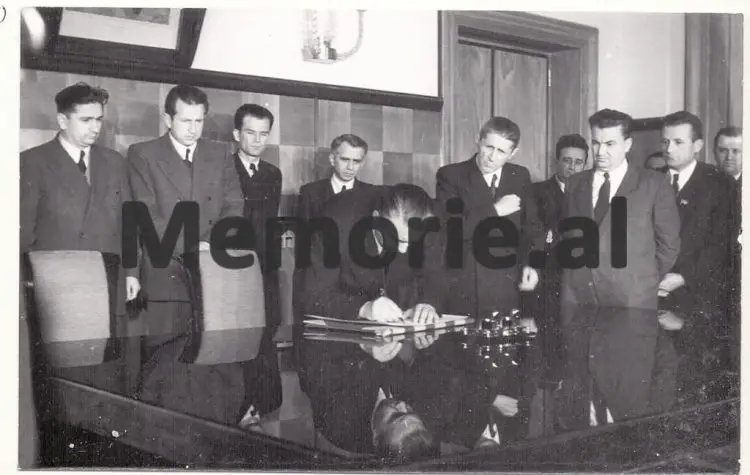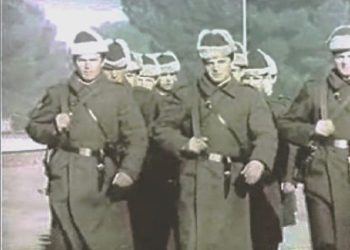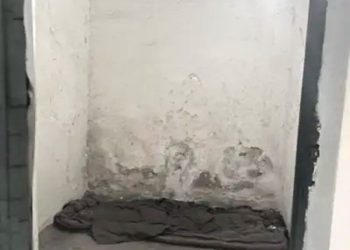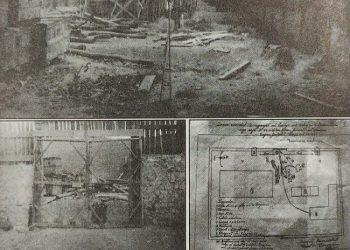Dashnor Kaloçi
Part nineteen
Memorie.al publishes a voluminous archival file issued by the institution of the Authority for Information of Former State Security Files, where there are hundreds of documents with the logo “Top secret” belonging to the former political prisoner, Xhavit Qesja, originally from the city of Kruja, whose family during the period of occupation of the country, 1939-1944, was closely associated with the Anti-Fascist Movement, being one of its main bases and made available all the wealth it had, as Xhavit was one of the first members of the Albanian Communist Party for the Kruja district, leading the Kruja-Ishëm partisan battalion and the 22nd Assault Brigade. Xhavit Qese’s political career after the end of the War, where he was appointed and served in senior positions in the Albanian Army, the apparatus of the Central Committee of the ALP, and several districts of the country, from where he was sent to study in the Soviet Union, where stayed until 1957, when he was announced to return to Albania urgently, after openly expressing his views in favor of the political line being pursued by the main Kremlin leader, Nikita Khrushchev, condemning the Stalin cult. Enver Hoxha’s conversation with Xhavit Qesen in his office in the Central Committee, where he sharply criticized him for the wrong views he had expressed during his studies in Moscow, urging him to reflect and make self-criticism, but Xhavit rejected the suggestion of the first secretary of the Albanian Labor Party, which caused him to no longer be allowed to go to the Soviet Union to complete his studies, but to be sent to work as deputy chairman of the Elbasan Executive Committee, from where a year later, he was expelled from the Party and exiled to Zvërnec Island, where the communist regime kept isolated some of the former senior party and state cadres whom he had condemned for their anti-party views. Xhavit Qesva’s long ordeal and persecution from 1957 to 1990, where he spent a full 32 years in prison and internment, being one of the few convicts in Burrell Prison who went on long hunger strikes in protest of the treatment and savage attitude that the communist regime of Enver Hoxha was holding towards him. The complete form, investigative and judicial file in charge of Xhavit Qeses, which is published for the first time by Memorie.al, which contains the documents of the former State Security that reflect the prosecution and wiretapping against him, the reports of Security collaborators with pseudonyms their correspondence with the letters he sent to the highest party and state instances, as well as the highest leaders of the ALP, until 1991 when he was released from prison!
Continued from the previous issue
Report-information of the State Security Operational Worker, Maliq Mersini, with the data of the Security collaborator with the nickname “Observer”, regarding the conversations made by the internees on the Island of Zvërnec
Taken from P.O. Maliq Mersini
Given by B.p. The “observer”
R E P O R T
On July 22, 1960, Pëllumb Dishnica, after noting how correspondence with families is delayed and does not come or go well, said: “When I was interned in Italy, letters came from Albania, faster than from Fier, let to tell us to write a letter a month, or one in two months, but at least they get us right. In Italy, whether the books, magazines or letters that came to us, they wrote openly: “Censorship, but they did not delay”.
On July 23, the conversation between the letters and the delay resumed, as Pellumbi became worried about the family that was waiting for him to come to the meeting. When Pëllumbi said that there are three or four letters without receiving them, apart from the ones I missed completely, Xhafer Vokshi said: “It was done to write less often, once every two weeks, or better as my wife told me, to write the letters and keep them there to give to family members when they come by themselves”!
On July 25, while talking about the events in the Congo, Xhaferi told me: “The Congo issue was complicated especially after the request of the Congolese Prime Minister for armed assistance to the Soviet Union.”
On July 31, when Amali Dishnica came to visit, I asked her about the issue of discussion, about the 11-year or 12-year school, and she told me: prepared than high school teachers today, students come unprepared and poor from elementary school even 12 years does not solve the whole problem, it should be done 5-year elementary school and not 4-year-old. “As for the discussion about the 11- or 12-year school, there is nothing original here; this has been done before in Czechoslovakia and Romania, etc.”
Amalia, who had brought the book in Russian, on Khrushchev’s speeches during 1958, showing the book to Xhavit Qeses, told Amalia: “Here you will find many things that have not been published by our press.” Xhavit started reading this book the next day, followed by Pellumbi. This book contains all of Khrushchev’s speeches on the situation in Hungary and the counter-revolution, as well as some speeches on Yugoslavia, which have either not been published at all in our press, or have been cut).
On August 12, speaking about the possibilities of his pardon, he told me: “They may even release me, but the fact that they still keep me inside, after so many explanations that I have had with them, means that they do not have clear some things, that they suspect when they open the file, that I have not explained and clarified everything. But I am a guy who does not know how to reserve or disguise himself, he does not hide my mistakes, I am not a hypocrite as a person, in the organization of the Union party that said in front of Fiqreta that he had a sympathizer sh. Mehmet, and in fact he had said all the blacks, no less than me, but he remained outside and I inside. “But it is better to say what you think than to hide it.”
On August 16, Xhaviti, giving Xhaferi the magazine “Problems of Peace and Socialism”, told him: “There are interesting things that you have nowhere to read”. A little later, Xhaferi, as I read an article (Science and ideology), said to Xhavit: “Here I mentioned Markovic, as a Yugoslav revisionist philosopher, and in 1948, he was arrested as an information bureaucrat, what changes people have undergone.”
On July 17, Agetina Vokshi, speaking about Peço Fidhi, said in front of everyone: “Now Peço has started to say that the Ministry of Interior has introduced him as much as possible”.
On August 20, Xhaferi, speaking on the Voice of the People article on terrorism in Yugoslavia, told me: “Most of the names are old facts, from the period before the Belgrade declaration, and today those people are free, then have made many mistakes in writing the names, have transformed them at all, I know many of them mentioned in the article, but have written them badly and transformed the names. Many of them, not only are cheap, but also are in convenient jobs. “With the penitent element, they behaved very well and this influenced, especially among us immigrants.”
“OBSERVER”
Report-information of the State Security Operational Worker, Maliq Mersini, with the data of the Security collaborator with the nickname “Observer”, regarding the conversations made by the internees on the Island of Zvërnec
Taken from P.O. Maliq Mersini
Given by B.p. The “observer”
Vlora on August 24, 1960
R E P O R T
As I wrote to you, since March, when Amali Dishnica, Pëllumb Dishnica and Xhavit Qesja came, they started to hold a contemptuous, contemptuous and hostile attitude, looking with hatred, teasing with nails, words and songs indirectly. But in harassment and provocation they have an elaborate method, which you cannot catch, as they do it indirectly, ostensibly as if talking to each other. They had recently started not talking to me at all, not even about basic things (like water, bread, etc.) if I had not spoken to them before, a kind of pressure by staying serious and arrogant, as if they had descended from heaven.
Here are some of the phrases they used with each other:
- Now that he is not wearing a jacket, where does he put the figure on?
- In the panties (says the other) – Pretends not to understand them, how can he be patient? – Does not want to be revealed (says the other).
- Silence is gold – In this case it is affirmation. – How much his morale has dropped! – He still holds himself. – Conventional signs.- Question marks.
- Na, you’s not even going to take from us (and shake your arm).
- For one we were sure, that the bomb in his hand exploded. – The other revealed himself. – Hopa lala that I saw him.
- Can this be lived? – With the devil in mind.
- What good is it? – It made you sick. – How did the fat come out? – That he has never had fat. – Coordination – According to a certain plan. Count (Captain)’s foxes – The fox was not killed. – Traces are seen in the forest. – The village that does not seem to want a guide, etc…
As I told you above, with these retorts, where one speaks the other respond, or they say it with songs, you have no way to catch them and ask for explanations. However, on August 19, since Xhavit Qesja directly harassed me, I asked him for explanations because I was being harassed. Here is how it happened:
Wanting to tease, Xhavit closed the window, in the middle of the heat, and then I told him, that it is good to keep it open, that it is hot and that it does not make us close it, that others are opening it, as this is capricious. Then Xhavit told me: “Do not speak to me in this language, as it is better for you.”
After I asked him why he puts this pressure and why he is better for me and how he did not answer, I told him that there is a command here and if he has anything to do with me, he can turn to the command, for whatever he knows, just I do not want to be harassed as they have been since March, when Amalia came and I mentioned songs and harassment.
With what cynicism the Jesuits denied them, such as, tell us the list of songs, which are forbidden, we have not harassed. Pëllumbi told me not to put his wife in his mouth, because if I have something to do with him, “I am good at bringing him by telegram”. I told him that I want to not be bullied, if you want to talk well, you do not want to, stay in your job, but do not bully anymore.
These 4-5 days have not bothered me anymore, but they stay like a mummy, without talking to me at all.
“OBSERVER”
Report-information of the State Security officer, Colonel Filat Muço, with the data of the Security collaborator with the nickname “Shkumbini”, regarding the conversations made by the internees on the Island of Zvërnec
Received from Colonel Filat Muço
Given by B.p. “Shkumbini”
Date 11 / III / 1961
R E P O R T
On February 4, 1961, when the family of Iljaz Ahmeti and Spiro Gjoka came, a small evening was organized and during the evening, Xhavit Qesja, Peço Kagjini and Foni Qirko drank. At this time Xhavit told me: “When Tuk Jakova came to Berat, I was the Secretary of the Party Committee and since I could not speak to him, I limited myself to a greeting with a smile.”Let this remain between us.”
At this time, Peço Kagjini, approached me and kissed me and said to Xhavit: “This is blood like us too”.
The IV Congress was attended with great interest, by Foni, Tahiri, Xhaviti, Peço and Pëllumbi. The readings of the discussions of the foreign delegates were done collectively. One thing is remarkable is that the discussions of the delegates, of the People’s Democracy, were read with great interest, as, for example, that of Czechoslovakia, Poland, the Soviet Union. While reading the discussions of the Chinese delegates and especially that of Vietnam, not only were they not listened to attentively, but on the contrary there have been ironic laughter from both Peço, Tahiri and Xhaviti.
In a conversation that Tahiri had with me on the issue of not allowing his wife to come here, he told me that it was now clear from the congress that these had broken with the Soviet Union and especially with the big one (for Khrushchev).
Foni, told me during a conversation that opened about the congress that now it is clear that two currents have been created in our camp and let’s see how the work will proceed and which one will win.
My attitude has always been that of the listener.
“SHKUMBINI”
Excerpts from the minutes with the depositions of Teme Sejko, against Xhavit Qeses!
IMPLICATION
EXCLUDED FROM THE PROCESS OF ARRESTED TEME SEJKO, FOR XHAVIT THE BAG
In the process dated 1/3/1961, the arrested Teme Sejko, testifies that:
“… Yes, in addition to what I have told about Panajot Plakut, I have to add the following:
Panajoti told me that he was involved in hostile activity by “Sala”. I do not know when he was recruited. Given the fact that after the end of the war, “Sala” once came to Albania, I think that then he should have ended this issue with Panajot. While the preparatory work with him, “Sala” must have developed, since the National Liberation War.
From the conversations with Panayot, I have clarified that there was an opposition in the country contrary to the leadership of the party and the government, with which Panayot was also connected. Panajoti mentioned to me that the opposition was hit hard, after the expulsion from the Central Committee of Tuk and Bedri. He told me that these works included: Hulusi Spahiu, Tahir Kadareja, Pëllumb Dishnica, Myzafer Spaho, Xhavit Qesja and later he also told me about Dali Ndreu and Liri Gega. Mentioning me Pëllumb Dishnica and Myzafer Spahon, who were colleagues in the Political Directorate of the Army, I also asked about the former political director, Kristo Themelko.
I remember Panajot explaining to me that after the severance of relations with Yugoslavia and the crackdown on Koçi Xoxa and his entire group, all those who were criticized, ie, most of them, for a while, disguised themselves by changing their position. Apparently, but in fact have developed hostile activity. This also belongs to Kristo Themelko. Regarding the above, Panajoti also explained to me his position, that under the guise of repentance, he liquidated the doubts, ie, erased the past and managed to be elected a member of the Central Committee, to become a general and to be appointed a member of the Government later… ”. Memorie.al
EXTRACTED FROM THE ORIGINAL
Operational Workshop
CAPTAIN (Jorgo Kareco) Tirana on 9/6/1961
The next issue follows











